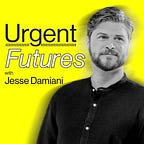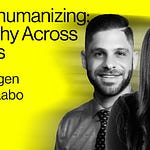Welcome to the Urgent Futures podcast, the show that finds {signals} in the noise. Each week, I sit down with leading thinkers whose research, concepts, and questions clarify the chaos, from culture to the cosmos.
👉 Never miss an episode! 👉 Subscribe to Urgent Futures now: Youtube | Apple Podcasts | Spotify.
My guest this week is Katherine Hayles.
N. Katherine Hayles is the Distinguished Research Professor at the University of California, Los Angeles, and the James B. Duke Professor Emerita from Duke University. Her research focuses on the relations of literature, science and technology in the 20th and 21st centuries. Her twelve print books include Postprint: Books and Becoming Computational (Columbia, 2021), Unthought: The Power of the Cognitive Nonconscious (Univ. of Chicago Press, 2017) and How We Think: Digital Media and Contemporary Technogenesis (Univ. of Chicago Press 2015), in addition to over 100 peer-reviewed articles. Her books have won several prizes, including The Rene Wellek Award for the Best Book in Literary Theory for How We Became Posthuman: Virtual Bodies in Literature, Cybernetics and Informatics, and the Suzanne Langer Award for Writing Machines. She has been recognized by many fellowships and awards, including two NEH Fellowships, a Guggenheim, a Rockefeller Residential Fellowship at Bellagio, and two University of California Presidential Research Fellowships. She is a member of the American Academy of Arts and Sciences. Her latest book is Bacteria to AI: Human Futures with our Nonhuman Symbionts from University of Chicago Press.
It seems like every month there’s a new reason that AI is all over the news. Lately it seems the notion of AI agents is back in the spotlight. As we develop ever more sophisticated AI, bots are able to act on our behalf—and some believe this is the most exciting future of machine learning. From bots that conduct research on your next roadtrip to bots that can customize learning programs for you, there’s lots of chatter about how this current wave will embody the promised utopian future of AI. Of course, it’s not all sunshine and rainbows—we quickly find ourselves back in thorny questions without clear answers. How much do we allow machine agents to act without supervision? What guardrails should we put on them? Is it ever possible to put enough guardrails in place that they won’t cause harm? Zooming out, it also forces us to grapple with more conceptual questions: what exactly is machine intelligence? What is intelligence? Are these sovereign beings or just advanced software? While these questions might at first appear like thought experiments, they have material impacts on the world.
Get your copy of Bacteria to AI here!
In my experience, the proposed answers to these questions tend to become either too hypothetical or too tech-focused; either too vague to be applicable or too obsessed with individual technical aspects to see the bigger picture and situate speculation within existing lineages of thought. It takes a rare mind to be able to navigate the converging and complex sciences, technologies, and theories and produce new, helpful ways of sensemaking all of it.
Professor Katherine Hayles has made a career of doing exactly this, shifting from an early career in chemistry to becoming one of the leading minds in the humanities examining science and technology. She became an intellectual hero of mine, and so many others, because of her contributions to posthumanist studies, namely through her landmark 1999 book How We Became Posthuman. In her latest book, Bacteria to AI, she extends this keen insight and deep research to propose a new theory of mind: the integrated cognitive framework. It’s a rethinking of cognition intended to decenter the human, including non-human and non-conscious cognition from—you guessed it—bacteria to AI. (But also plants and animals). It’s a wild mutant of a book, drawing in ideas from evolutionary biology to machine learning, feminist studies to speculative fiction. I can’t recommend it enough, so go grab your copy now—and in the meantime, please enjoy this conversation with Katherine Hayles.
Another episode you might like:
Dennis Yi Tenen: The Hidden History of Modern AI & Machine Learning | Urgent Futures Ep. 7
Welcome to the Urgent Futures podcast, the show that finds signal in the noise. Each week, I sit down with leading thinkers whose research, concepts, and questions clarify the chaos, from culture to the cosmos.
Support Reality Studies
NOTE: Thank you for supporting my work by purchasing these products through the links provided. I will only ever share products I actually believe in.
Health & Wellness:
ZBiotics: Right now, get 10% off ZBiotics. Just head over to zbiotics.com and use code JESSEDAMIANI. If you have an evening with drinking and a morning you need to feel fresh, these are a great help. Genetically engineered by a team of PhD microbiologists, ZBiotics is a probiotic drink that breaks down the byproduct of alcohol responsible for rough mornings after drinking (acetaldehyde).
MUD\WTR: Right now, get 30% off on starter packs using this link. There’s four different blends to choose from, but my current favorite is :rest. “This is our protest to hustle culture,” they say, and that resonates with me. Not only does it actually help me ramp down to sleep, but since I froth a little milk and make a latte with it, I get the warm cozy feeling of morning coffee at night. (For the evening tea drinkers out there: I’m not saying it’s better, just different!)
Mission Farms CBD: Right now, get 25% off your first order using this link to sign up for emails. Mission Farms CBD crafts full-spectrum CBD products for specific conditions like sleep, stress, and discomfort, using a combination of CBD and terpenes found in essential oils. I swear by this stuff. All of Mission Farms’s CBD comes from a small farm in Bend, Oregon. They farm the hemp organically, tend every plant by hand, and test for purity four times: the soil, the hemp, the hemp-extract, and the final products. This CBD is designed for wellness and it shows.
Digital Hygiene:
NordVPN: For a limited time, get up to 72% off using this link. Some people tell me that “VPN” brings to mind ideas of hackers and the dark web, but honestly VPNs are just an extremely easy way to stay much safer online. I’ve used NordVPN for the past four years, and appreciate what they offer, including Threat Protection against malware, 24/7 customer support, fast speeds, and more. One account can protect up to 6 devices (phone and computer), and they don’t track or share what you do online. Another benefit: you can always access the content/apps you have at home, wherever in the world you are.
1Password: Listen, I know from personal experience that password managers don’t make for the most riveting dinner party conversation, but I need to express 3 things: 1) They make your life so much easier—it’s called “1Password” because once you get set up it’s the only password you’ll ever need to remember again. 2) They make your online life so much safer, ensuring that you use unique passwords for every account, stored with a high degree of encryption. 3) They are not nearly as complicated to set up as you think they are! Head over to 1Password using this link for a free trial, and individual plans for less than $3/mo after that.
CREDITS: This podcast is edited and produced by Adam Labrie and me, Jesse Damiani. Adam Labrie also directed, shot, and edited the video version of the podcast, which is available on YouTube. The podcast is presented by Reality Studies. If you appreciate the work I’m doing, please subscribe and share it with someone you think would enjoy it.
Find more episodes of Urgent Futures at: youtube.com/@UrgentFutures. Past conversations include Taylor Lorenz, Lisa Messeri, Legacy Russell, William E. Rees, Renée DiResta, and more. Here is another recent episode with feminist theorist Minna Salami:



















